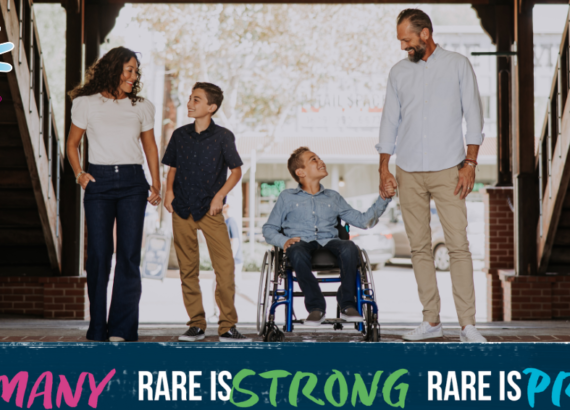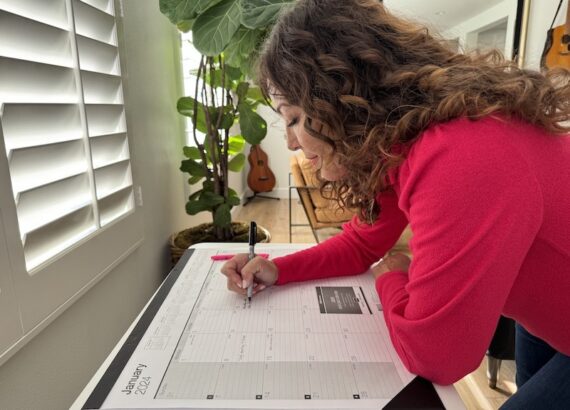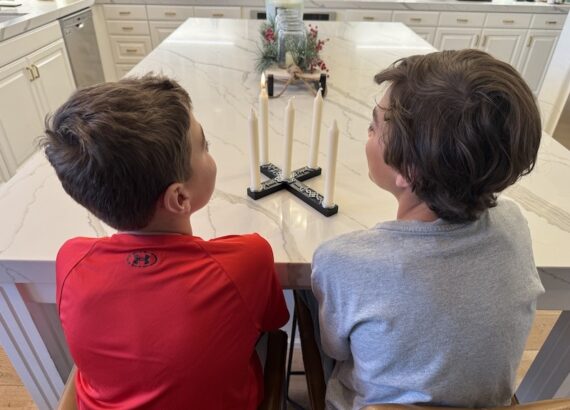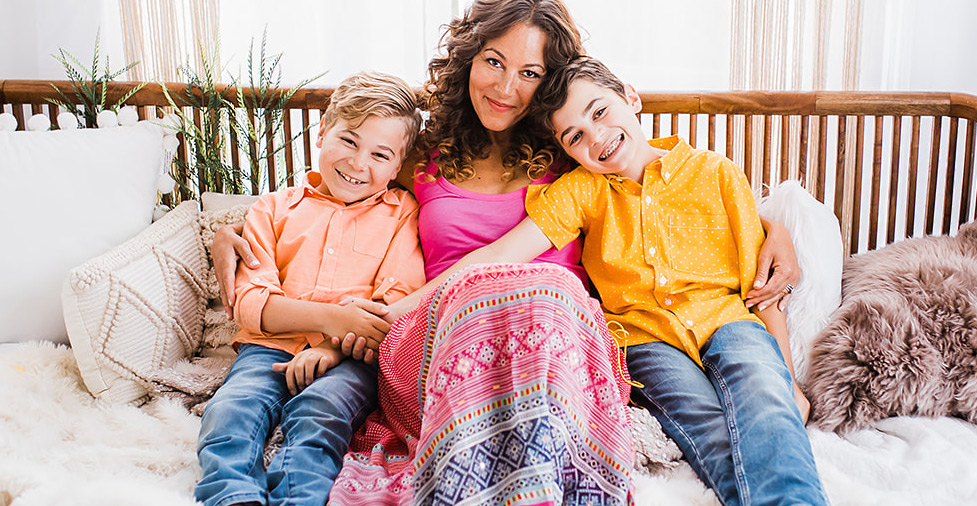Stages of a Rare-Disease Diagnosis
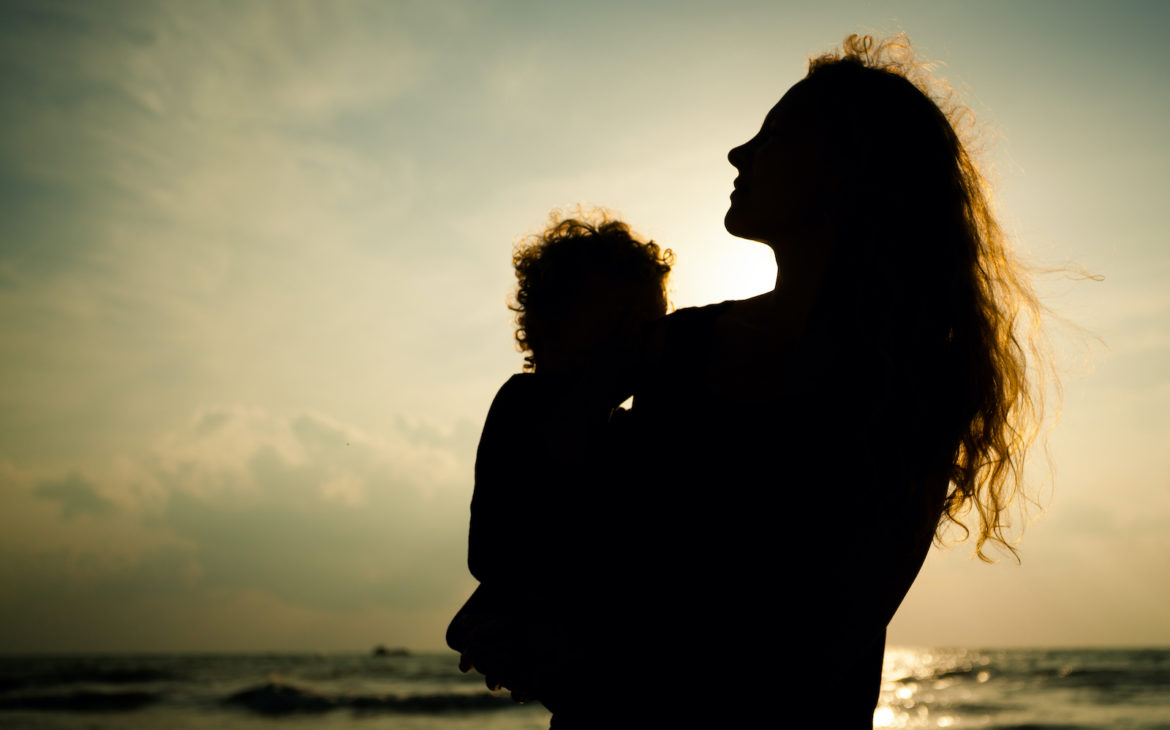
Getting a confirmed rare-disease diagnosis that delivers the type of news you never wanted to hear is one of the hardest things to go through in life. No one is prepared. When a diagnosis is deemed “rare,” another layer of stress and anxiety is added. Rare, by its very definition, can bring up feelings of aloneness. That doesn’t mean we would feel any less grief about a diagnosis that is more well-known, or that a more well-known diagnosis would be any less challenging to manage. It’s just that when we’re delivered alarming news, and we don’t fully understand what that news means, it can send us straight into a panic. Many of us didn’t even know our child’s rare disease existed, let alone anything about it, until they were diagnosed.
When I received my son’s diagnosis of spinal muscular atrophy, I learned that the prevalence of his disease is 1 in 11,000. According to the National Organization for Rare Disease (NORD), a rare disease is any disease, disorder, illness, or condition affecting fewer than two hundred thousand people in the United States. I understood right away that my son’s disease was rare, but what I didn’t know is that while there may not be many children with my son’s particular disease, millions of people are living with some type of rare disease.
There are more than seven thousand rare diseases, and these diseases impact more people than cancer and AIDS combined. Most rare diseases are genetic or have a genetic component, and for many rare diseases, signs and symptoms may be observed at birth or in childhood. Fifty percent of those who have a rare disease are children.
In the United States, an estimated fifteen million children live with a rare disease; that’s one in twenty—a significant segment of the nation’s population. Worldwide, two hundred million children have a rare disease, disorder, condition, or syndrome.
Although our child’s rare diagnoses may be different, various aspects of the rare-disease journey are common for us mothers. In talking to many rare-disease mothers and looking back on my own journey, I have found that we move through various stages after a rare-disease diagnosis for our children. I don’t know where you are post-diagnosis, but I’d like to share a few things for those whose children are newly diagnosed. Some of the things I’ve learned along the way would have been so helpful for me to know up-front. Time has shed perspective, and I’d love to share that perspective with you. My hope is that it helps you right now, at the beginning of your journey.
We are all different people, and the way we react to situations varies. We can move through various stages at different times, in a separate order and with different experiences. They can look different for all of us, but I’d like to outline some of the common themes that may help you relate to and prepare for the stages ahead. For ease of explaining, I have named these stages and briefly described some of the common feelings I, and many mothers I know, have gone through. I call these stages the “The Wondering,” “The Waiting,” “The Reckoning,” “The Wailing,” “The Wandering,” “The Work,” and “The Awakening.”
The Wondering
Many of us start our rare-disease journey here. It begins with a slow, deep, prickling sense that something about our child’s health may not be quite right. Maybe it’s an unmet milestone, your child’s not walking, a developmental delay, global delay, problems feeding, problems sleeping, or pediatric anxiety. We notice something here. We see something there. We question. We dismiss. We question again. We wonder. We may even point it out to others around us. Well-meaning people in our life may reassure us that everything is okay: “He’s a late bloomer.” “She’ll get there in her own time.” “Every child is different.” Still, something in our gut is sending us messages that say otherwise. We stew. We contemplate. We question some more. We so desperately want everything to be okay, but we can’t ignore the voice in our head telling us that something is amiss. We wrestle around with all these questions until they have worn us down so much that we can’t ignore them anymore. Add in just one more worrisome sign and the entire scale tips over to the point of no return where we must take steps to address it. Even if we are dead wrong, we have to be sure. Enter the next stage.
The Diagnostic Odyssey: The Waiting
We begin down the road of seeking answers. Doctors and specialists are enlisted. The process of getting to a rare-disease diagnosis is a huge challenge, often named a diagnostic “odyssey.” It takes an average of six to eight years to diagnose a rare disease, and that’s even in countries with sophisticated health systems. The average child sees seven specialists before receiving a rare diagnosis. Many children receive multiple misdiagnoses along the way. This waiting game pulls and pricks at our already fragile state.
We sit in constant unrest, worry, and confusion. Perhaps one test comes back negative. We feel a quick “Phew, we dodged one!” only to be left with the bigger, unanswered question that remains. Inevitably, we’re on to the next test. Relief then unrest. More relief then unrest. Up-down, up-down, up-down. My husband and I went through six months of testing with our son before he received his rare-disease diagnosis. Those six months seemed like an eternity. And that’s not even long compared to other mothers I know who’ve waited years. Sitting in unrest for such sustained periods can wear on you tremendously. “The Waiting” is no easy stage. This type of waiting is hard work.
The Reckoning: The Rare-Disease Diagnosis
“The Reckoning” is the moment of truth. This is the moment you’re delivered a piece of news that will forever change your life. It is the piercing, time-stopping, ground-shaking moment of receiving a rare-disease diagnosis. Many mothers describe it as a complete and utter state of shock. No sound. Just space. And silence. A flip of a switch and the lights have gone dark.
I can still remember that day vividly, and even now it’s hard for me to think about it without all kinds of feelings welling up. The doctor did yet another test, but instead of coming back normal, this one came back abnormal. All of my worst fears were confirmed in a blink of an eye. Yes, something was wrong. Then we had to walk to another floor of the hospital to get a genetic blood test that would eventually confirm the doctor’s suspicions of SMA. Time stood still. There was silence. Complete silence, except for the sound of my breathing and my footsteps walking those halls to the lab. The reckoning was and forever will be one of my darkest hours.
The Wailing
Receiving the news that something is wrong with your child is the unexpected plot twist in the story of our life. When we learn we are going to become a mother, though we don’t know in advance exactly how each step will unfold, we count on certain things—like our children being born, depending on us, growing, becoming independent, having the opportunity to start a family of their own, outliving us, and thus is the circle of life. But what happens when they face a rare disease? Even more, what happens when that rare disease has gripping effects on our child’s health and life expectancy? What happens when the circle of life we counted on is interrupted, changed, or derailed completely?
As the shock of a rare-disease diagnosis wears off, the grief can quickly arrive. Grief is the acute pain that accompanies loss. It can come in many forms, including anger, denial, guilt, bargaining, and depression. Grief can have emotional, physical, and physiological responses. It can be a numbing freeze or an all-out wail. Grief has its own trajectory and is different for all of us.
For me, as the shock wore off, the pain set in. Grief washed over me like an all-out flood. I’m talking on hands and knees, on the cold bathroom floor, wailing. This “Wailing” period was truly the definition of distress. I felt it in every bone of my body and with every beat of my heart.
I grieved. I grieved for months. I cried my eyes out. I would literally wake up and remember all that my son would have to go through, start crying, and fall back into bed—day after day, the same thing. Wake up, cry, and repeat. The pain was beyond anything I had experienced or imagined. And I couldn’t change it.
I don’t know where you are in your journey, but I can tell you a few things about this stage of my journey as I look back on it now. The grieving I went through was important, though I didn’t realize it until later. It was a vital step in the journey. The grieving meant I was looking at my son’s new reality in the face. I was absorbing all that a rare-disease diagnosis meant and all that it entailed. As hard as it was, I was wrapping my head around it.
You have to let yourself grieve. You have to deal with your grief directly. The Bible even says that we are supposed to grieve over our losses. When we experience a painful loss, we need to grieve over it. “The Wailing” is a crucial step that shouldn’t be skipped or the grief will well up and find you later. You either deal with it now, or you’ll find yourself still struggling with emotional pain years down the road.
All of that sadness has to come out. If you hold it in, you’ll explode. And if you let the sadness beat you down, you’ll implode. Don’t repress it. Don’t suppress it. Release your grief so your heart can begin to heal. If you haven’t already, give yourself the time to truly grieve.
The other thing that the grieving process allowed for was letting go. I was letting go of the way I thought things would be, the plans I had in my head for my son and our life, and the typical road that I’d been counting on. Letting go is a necessary step in the process of acceptance. This shedding of the life we thought we’d have is the only way we can truly live the life we have been given.
Another thing I learned is that your feelings about your child’s diagnosis may change as time passes. The way you feel at the beginning is not necessarily the way you’re going to feel forever. You will adapt. It’s difficult to believe this at the beginning, and I understand if you have no idea what I’m talking about or if you think I’m flat-out crazy. But as I look around at all my rare-disease mom friends, I don’t see them carrying the same grief as they did when their child first received their rare-disease diagnosis. In fact, I see most of them being tremendously resilient and hopeful. It’s a process that happens over time. I hope it is comforting to know up-front that there is potential for your grief to change over time.
Mama, can I tell you something else? Be kind to yourself during this time. This is probably one of the most unprecedented times of your life. You may see yourself in a way you’ve never seen yourself. For me, it was the first time I had seen myself truly shaken. I had been through difficult life events before, but none that I didn’t think was a normal rite of passage or a thing I couldn’t ultimately overcome. But this—this felt outside of normal. This felt like I was hit by a truck. I lived outside of myself for a while. For the first time, I had no control over my emotions or my head that was spinning wildly out of control. I walked like a zombie through those first months.
This, too, is all normal. This is what it looks like when a body, heart, and soul are turned entirely upside down. It looks messy. And that’s okay. So give yourself a little grace during this time. Mama, this is hard. Really hard. It may look a bit different for each of us. There is no “right way” to do this. So let yourself process, feel, grieve, understand, and make your way through “The Wailing.”
The Wandering
Another phase you may find yourself in after the diagnosis is what I call “The Wandering.” This is the unknown space we swim in after a diagnosis, and it can be a scary sea filled with what-ifs, worst-case scenarios, feared futures, and catastrophic thinking. We are human, and these are the places the human mind roams without validated information, confirmed facts, and solid truths.
This is especially true with a rare-disease diagnosis, because we don’t know what we’re facing. Rare diseases are unheard of and complex. Rare diseases come with a considerable learning curve. Even many of our doctors may not know protocols and best care practices for our child’s rare disease. We are delivered a rare-diseases diagnosis, and then we have to go chase down facts and information just to understand what we are dealing with. We don’t know any other way to feel than sad and scared because we don’t even completely comprehend what we are up against.
You may have started with all these hopes and dreams of the life you were going to give your child, only to have those dreams disrupted by something entirely beyond your control and understanding. You have been set adrift in The Wandering. A place where we can’t count on certain truths and universals, and so we feel like we can’t count on anything. We wander around with unending questions—what-ifs, what-nows, hows, whens, etc.
My son’s rare-disease diagnosis of spinal muscular atrophy came with so much weight and so many implications and questions:
- Would my child be okay?
- How would my child’s health unfold?
- How would I care for my child?
- How would I keep my child healthy?
- How would I watch my son slowly regress?
- How would I care for my other son?
- How would both of my sons still enjoy their childhood?
- How would I still work?
- If I quit my job, how would we manage on half of our income?
- How would I have time for my marriage?
- How would I have the strength to endure?
I wandered around with all these looming questions, and as my list of questions grew, so did my anxiety. It was a state of complete unrest, worry, confusion, and disbelief.
Let me be very honest: looking back now, I can tell you this unknown time is also one of the hardest parts of this journey. I say this not to frighten you even further, but to validate everything you are feeling. I also say this to reassure you that there is the next phase, and you will come to it. I think it’s essential for you to know this. Right now, when perhaps you are in the trenches. Or maybe while you don’t see a way. When everywhere you look may be gray and sad and scary. As hard as it is to imagine, I promise you, you will move to the next phase. In your time, when you are ready. I’m not saying it’s going to be easy, but I am saying it’s going to be easier.
The Work
So here you are. You’ve made your way through “The Reckoning,” “The Wailing,” and “The Wandering,” and you’re ready to do “The Work.” You’ve cried, you’ve grieved, you’ve mourned the life you thought your child would have. You so desperately love your child that although you feel like you don’t know what you’re doing, you’re willing to do whatever it takes to help them. You most likely still feel sad, scared, and confused, but you’ve come to a place of readiness to do “The Work.” This is the stage when you dig in and get busy. This phase may look different for all of us, and it may take shape a thousand different ways.
You may be running your child around to appointments. You may be making calls. You may be getting medical equipment and learning how to use it. You may be meeting new care providers. You may be talking to school staff. You may be busy. Sometimes you may be overwhelmed.
This phase may take off running, or it may be filled with starts and stops. It may be packed with trials and errors. It may be occupied with baby steps or full-on sprints.
You’ll be learning. You’ll be growing. You will do hard things. You will become stronger. Your confidence will increase. Your resilience will grow. Your abilities will expand. You’ll shed old layers. You’ll develop new habits. You’ll grow new skin. And ultimately, you’ll find your new normal. When you find you’re in this stage of being ready to do the work, check out my article “The 6 Things You Need to Begin Your Rare-Disease Fight,” to get you started.
The Awakening
One day in the deep thick of doing the work and taking care of business, you’ll notice something funny and you’ll laugh. Your laugh may surprise you. Maybe you thought you’d never laugh again. Maybe nothing has seemed funny in a very, very long time. Then one day, right there in the midst of the busy, the chaos, and the to-dos, you’ll look up and find the beauty in your life.
I don’t know how to explain this, because when my son was first diagnosed, I wondered how I would ever even smile again. Joy seemed to be a thing of the past. But something happens along the way. Not only does your whole life change, but you also change. Once you’ve hacksawed your way through this crazy jungle, overturned every stone for answers, and left your blood, sweat, and tears along the way, something changes inside you.
Maybe it’s because things have been so hard that when something good happens, it’s an almighty hallelujah! Or maybe it’s because your perspective changes, and you realize that when something beautiful happens, it truly is a gift. Or maybe you’re just so dang worn out and haven’t slept for so long that you’re starting to hallucinate. Whatever it is, I’m here to tell you that your broken heart will slowly begin to beat again. You will find joy in something simple or even mundane.
Then joy and beauty will start showing up for you—in the morning, at work, at the grocery store, in your dreams. You’ll start to see things through a different filter. Instead of seeing what your life doesn’t have, you’ll see what it does. You’ll start to see what you can make of it. You’ll choose to make the best of it. Instead of seeing what your life lacks, you’ll see what it offers. Instead of holding on to the life you thought you’d have, you’ll embrace this life you were given.
You’ll find that, even though your child’s life is different from what you expected and they may lack things you wished for them, they have undeniable gifts and there’s beauty in the simple moments with your family.
You will laugh again. You will make a joke again. You will find your sense of humor again. You will. It may be gone for a short time, or it may be gone for a long time. But it will return.
Even if your situation never changes, the feelings of desperation and despair can certainly change. Like each day, the sun will rise again after the darkness.
Although I can still feel the sting of the diagnosis phase in my heart like it was yesterday, I have moved forward since my child’s rare-disease diagnosis. I’ve traveled through many stages. What I’ve come to find is that I’ve evolved. I want you to hear this, mama. Right now, right where you are. It changes. Your feelings will not remain this way forever. This is a hard road, no doubt, but how you deal with it will change as you move along its path.
I now feel things I never imagined I would ever feel again. I feel hope. I feel wonder. I feel gladness. I laugh again. I dream again. There are beautiful moments everywhere. There is true connection.
I am a rare-disease mom, just like you, and I am here to tell you, the hard work you are doing will cultivate extraordinary and beautiful things in your life. It will cultivate extraordinary and beautiful parts of you.
Life will move to the next stage. Life continues on. Don’t stop where you are.
Keep going.

Source: “Rare Facts,” Globalgenes.com, 2019, https://globalgenes.org/rare-facts/ ,
“Rare Disease Facts,” Rarediseases.org, https://rarediseases.org/wp-content/uploads/2019/02/nord-rareinsights-rd-facts-2019.pdf,
“Spinal Muscle Atrophy (SMA),” Curesma.org, 2020, http://www.curesma.org/about-sma/
